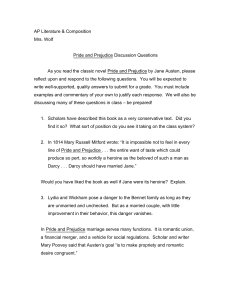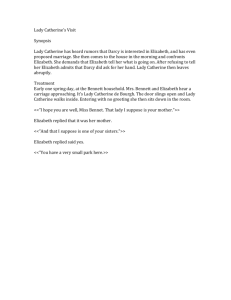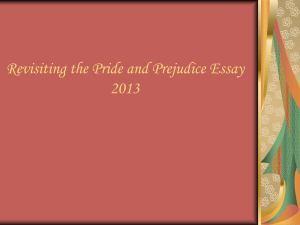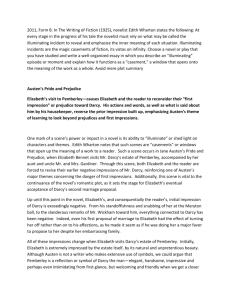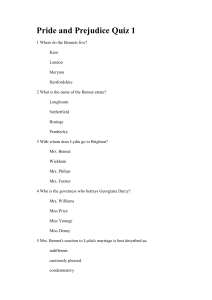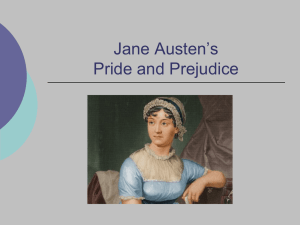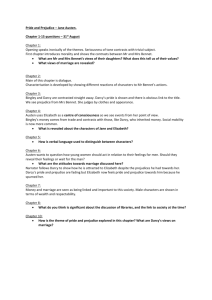Themes and Critical Issues in Pride and Prejudice.doc
advertisement
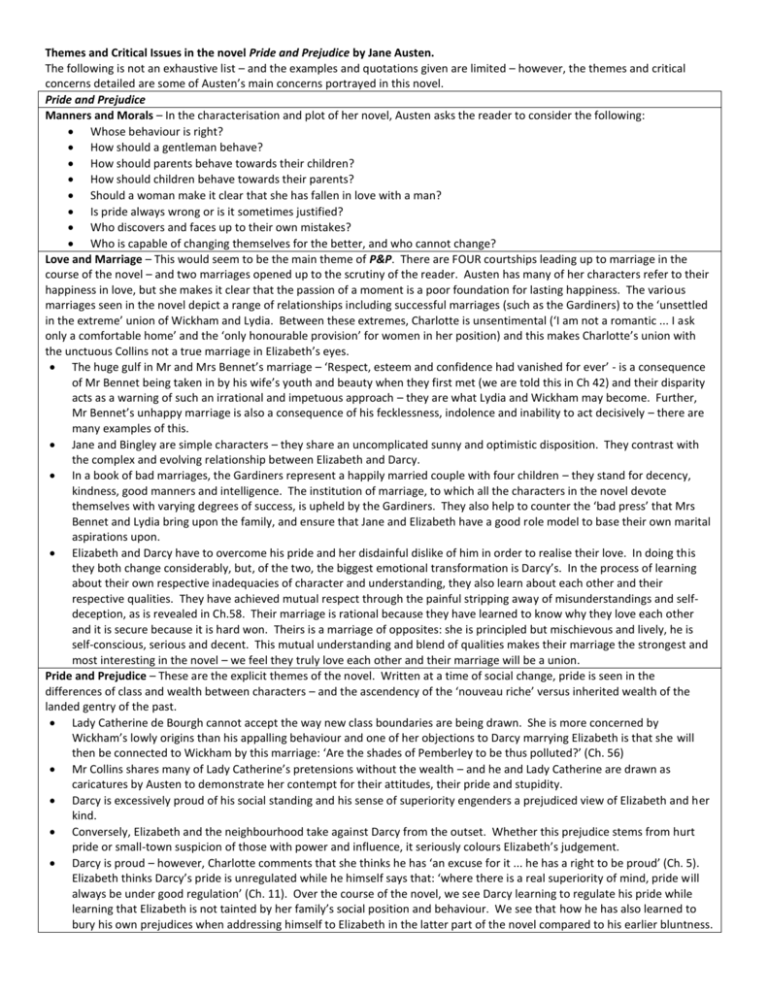
Themes and Critical Issues in the novel Pride and Prejudice by Jane Austen. The following is not an exhaustive list – and the examples and quotations given are limited – however, the themes and critical concerns detailed are some of Austen’s main concerns portrayed in this novel. Pride and Prejudice Manners and Morals – In the characterisation and plot of her novel, Austen asks the reader to consider the following: Whose behaviour is right? How should a gentleman behave? How should parents behave towards their children? How should children behave towards their parents? Should a woman make it clear that she has fallen in love with a man? Is pride always wrong or is it sometimes justified? Who discovers and faces up to their own mistakes? Who is capable of changing themselves for the better, and who cannot change? Love and Marriage – This would seem to be the main theme of P&P. There are FOUR courtships leading up to marriage in the course of the novel – and two marriages opened up to the scrutiny of the reader. Austen has many of her characters refer to their happiness in love, but she makes it clear that the passion of a moment is a poor foundation for lasting happiness. The various marriages seen in the novel depict a range of relationships including successful marriages (such as the Gardiners) to the ‘unsettled in the extreme’ union of Wickham and Lydia. Between these extremes, Charlotte is unsentimental (‘I am not a romantic ... I ask only a comfortable home’ and the ‘only honourable provision’ for women in her position) and this makes Charlotte’s union with the unctuous Collins not a true marriage in Elizabeth’s eyes. The huge gulf in Mr and Mrs Bennet’s marriage – ‘Respect, esteem and confidence had vanished for ever’ - is a consequence of Mr Bennet being taken in by his wife’s youth and beauty when they first met (we are told this in Ch 42) and their disparity acts as a warning of such an irrational and impetuous approach – they are what Lydia and Wickham may become. Further, Mr Bennet’s unhappy marriage is also a consequence of his fecklessness, indolence and inability to act decisively – there are many examples of this. Jane and Bingley are simple characters – they share an uncomplicated sunny and optimistic disposition. They contrast with the complex and evolving relationship between Elizabeth and Darcy. In a book of bad marriages, the Gardiners represent a happily married couple with four children – they stand for decency, kindness, good manners and intelligence. The institution of marriage, to which all the characters in the novel devote themselves with varying degrees of success, is upheld by the Gardiners. They also help to counter the ‘bad press’ that Mrs Bennet and Lydia bring upon the family, and ensure that Jane and Elizabeth have a good role model to base their own marital aspirations upon. Elizabeth and Darcy have to overcome his pride and her disdainful dislike of him in order to realise their love. In doing this they both change considerably, but, of the two, the biggest emotional transformation is Darcy’s. In the process of learning about their own respective inadequacies of character and understanding, they also learn about each other and their respective qualities. They have achieved mutual respect through the painful stripping away of misunderstandings and selfdeception, as is revealed in Ch.58. Their marriage is rational because they have learned to know why they love each other and it is secure because it is hard won. Theirs is a marriage of opposites: she is principled but mischievous and lively, he is self-conscious, serious and decent. This mutual understanding and blend of qualities makes their marriage the strongest and most interesting in the novel – we feel they truly love each other and their marriage will be a union. Pride and Prejudice – These are the explicit themes of the novel. Written at a time of social change, pride is seen in the differences of class and wealth between characters – and the ascendency of the ‘nouveau riche’ versus inherited wealth of the landed gentry of the past. Lady Catherine de Bourgh cannot accept the way new class boundaries are being drawn. She is more concerned by Wickham’s lowly origins than his appalling behaviour and one of her objections to Darcy marrying Elizabeth is that she will then be connected to Wickham by this marriage: ‘Are the shades of Pemberley to be thus polluted?’ (Ch. 56) Mr Collins shares many of Lady Catherine’s pretensions without the wealth – and he and Lady Catherine are drawn as caricatures by Austen to demonstrate her contempt for their attitudes, their pride and stupidity. Darcy is excessively proud of his social standing and his sense of superiority engenders a prejudiced view of Elizabeth and her kind. Conversely, Elizabeth and the neighbourhood take against Darcy from the outset. Whether this prejudice stems from hurt pride or small-town suspicion of those with power and influence, it seriously colours Elizabeth’s judgement. Darcy is proud – however, Charlotte comments that she thinks he has ‘an excuse for it ... he has a right to be proud’ (Ch. 5). Elizabeth thinks Darcy’s pride is unregulated while he himself says that: ‘where there is a real superiority of mind, pride will always be under good regulation’ (Ch. 11). Over the course of the novel, we see Darcy learning to regulate his pride while learning that Elizabeth is not tainted by her family’s social position and behaviour. We see that how he has also learned to bury his own prejudices when addressing himself to Elizabeth in the latter part of the novel compared to his earlier bluntness. We also see Elizabeth coming to terms with her own prejudice against Darcy – her first impressions, made quickly and based on what she perceives to be his stand-offish aloofness, lead her astray. Similarly, she learns that her first impressions of Wickham are very wrong – she learns that a classic human prejudice in favour of a charming and handsome outer shell is not to be trusted. Exaggerated pride is best displayed by Lady Catherine and blind prejudice by Mrs Bennet. When Lady Catherine appeals to Elizabeth’s sense of ‘honour’, ‘decorum’ and ‘prudence’ (Ch.56), she is not so much taking pride in her high moral standards as she is displaying her own vanity by trying to protect her interests in a most arrogant way. Caroline Bingley’s ‘superciliousness’ (Ch.6) and unguarded snobbery towards almost everybody, soon merges into jealousy towards Elizabeth; and her obvious attempts to ingratiate herself with Darcy reveal the true vulgarity of her arrogance and self interest, despite her proud public face. Mr Collins’s inflated pride in his own worth is seen as no more than misplaced vanity and conceit, and sycophantic toadying to Lady Catherine. Charlotte displays no vanity but, in agreeing to marry Collins, Elizabeth feels Charlotte lacks personal pride and shows a readiness to compromise her judgement in a way that Elizabeth would never consider. The novel alerts the reader to the dangers of making crude judgements based on first impressions – to do so is to invite prejudice: Elizabeth rushes to damn Darcy on insufficient evidence; Darcy is proud but his proud manner is misconstrued as the kind of patronising arrogance displayed by his aunt, Lady Catherine. Austen also posits the idea that how well we know others is determined by how well we know ourselves. The conclusion is that rational love is selfless and devoid of vain pride and thoughtless prejudice, but to achieve that one must know oneself – hence the essential emotional transformation and journey to self-knowledge that both central characters make over the course of the novel. Character – as a theme in the novel, we can see that the main characters’ individual personalities - ie the bundle of attitudes and behaviours that make up a person – is touched upon variously in the novel. Bingley says to Elizabeth: ‘I did not know before that you were a studier of character. It must be an amusing study’ (Ch 9); in response to Darcy asking why she is asking so many questions, she replies: ‘merely to the illustration of your character, I am trying to make it out’ (Ch 18). In her mistaken reading of Darcy’s motives when she refuses his marriage proposal, she sees his character as being the collection of choices made in the battle between desire on the one hand and rational compromise on the other. However, Darcy’s actions do eventually reveal his true character – and Elizabeth approves. Further, she acknowledges that – having initially been so wrong in her assessment of both Wickham and Darcy’s respective characters – she has not understood or known her own character: ‘I, who have prided myself on my discernment ... Till this moment, I never knew myself’ (Ch 36). In the novel, this study of the essence of ‘character’ is depicted through a range of behaviours: some characters are the victims of their feelings and desires – Lydia for example, and Mrs Bennet whose feelings pour out of her unchecked by any sense of reason or rational. The Role of Women – In the conventional society of Jane Austen’s day, a woman’s role was fairly clear. Put most crudely, her position in life was defined by her father or her husband and she was expected to be modest, submissive and incapable of independent thought. With few exceptions, women’s education was inferior to that of their male contemporaries. Austen was part of that society and in many respects the very form and subject of her novels would seem to accept women’s traditional role. She is not, however, uncritical. Moral deficiency is loosely linked with a narrowness of outlook, often compounded by lack of intelligence. It is easy to laugh at Mrs Bennet’s ‘fidgets’ (Ch.53) and her wild changes of mood but she remains a ‘woman of mean understanding’ (Ch.1) who is incapable of exercising any moral discrimination. Lydia’s ‘animal spirits’ (Ch.9) are likewise linked to the fact that she is ‘vain, ignorant, idle’ (Ch.41). The simpering Caroline Bingley and the overbearing Lady Catherine also reveal their cultural poverty when they display their lack of genuine interest in reading and music. The comfortable Charlotte does not lack intelligence but she sacrifices her individuality by marrying Mr Collins. Much of this ignorance we see through Elizabeth’s eyes. She cannot abide small talk – ‘Their table was superlatively stupid. Scarcely a syllable was uttered that did not relate to the game’ (Ch.29) – preferring the greater stimulus of conversational fencing with the gentlemen. The characterisation of Elizabeth seems to represent something of a departure from the conventional image of women at that time. Above all, Elizabeth possesses wit, intelligence and an independence of thought that sets her apart, even from her elder sister. Austen was writing at the same time as Mary Wollstonecraft (mother of Mary Shelley who wrote ‘Frankenstein’), who was pioneering women’s rights and argued that, in order to aspire to equality, women should devote their energies to reason and independent thought. However, it would be wrong to suggest that Elizabeth represents ‘new women’. Despite her misgivings, she is a dutiful daughter and, whilst she was prepared to reject one of the richest men in England, ultimately she is anxious to assume her role as mistress of Pemberley: ‘she looked forward with delight to the time when they should be removed from society so little pleasing to either, to all the comfort and elegance of their family party at Pemberley’ (Ch.60). We must also remember that in Austen’s work it is a woman’s perception of events that we are shown: we never see men apart from in the company of women. We are shown sisters, mothers, aunts and female confidantes exchanging views, discussing events and sharing secrets. Many different points of view about marriage are expressed throughout the novel, from Mrs Bennet’s obsessive ambition and planning to Mr Bennet’s disdainful irony. But, as detailed above, the nature of a good marriage seems the book’s major theme and it does not present in a positive light any other possible role for educated young women. At the end of the novel, Mary Bennet is heading for an unmarried life looking after her mother, but her character and learning have not been rendered as admirable, in fact, the narrator suggests that Mary’s studies were a strategy to compensate for her lack of beauty! In Chapter 8 there is a discussion of the ‘accomplishments’ of young ladies. Bingley is in admiration for their ability to ‘paint tables, cover screens and net purses’. Darcy wants more than this – and even more than the list Caroline Bingley provides of ‘music, singing, drawing, dancing and the modern languages’, plus ‘something in her [a woman’s] air and manner of walking’! To all of these Darcy adds ‘the improvement of her mind by extensive reading’ (Ch.8). We know nothing of Elizabeth’s reading, though Darcy attempts to draw her into discussion of literature at Netherfield Ball. She can sing and play the piano but, to Lady Catherine’s horror, does not draw! What the novel does present is Elizabeth’s independence of mind and the spirited freedom of her thinking about her world, even in spite of its narrowness, snobbery and the straitjacket of its conventions. Darcy calls it ‘liveliness of mind’ and she brands it ‘impudence’ when, at the end of the novel, they are discussing their first conversations: ‘you were sick of civility, of deference, of officious attention. You were disgusted with women who were always speaking and looking and thinking of your approbation alone. I roused and interested you because I was so unlike them’ (Ch.60). Elizabeth’s desirability rests in her intelligence and charisma, rather than any set of learned accomplishments. Elizabeth controls the conversations at Netherfield, and always dominates Darcy in conversation. She tells her father that Lydia should be controlled. She stands up to Lady Catherine. She breaks the silence between herself and Darcy by thanking him for his secret generosity to Lydia. Within the limits of her situation, Elizabeth Bennet is an extremely strong young woman – but this strength does not go beyond the conventional propriety of a daughter and wife; duty to family and husband remains central to the female agenda. [Paraphrased from sections of York Notes Advanced – ‘Pride and Prejudice’.] Social Hierarchy and Moral Perspective Darcy prides himself on being a gentleman with all the duties and obligations that his status entails. Caroline Bingley constantly reminds him he would be lowering himself by associating with the Bennet family as they are connected with trade – and are now in straitened circumstances. Elizabeth, however, strongly asserts her dignity when she tells Lady Catherine: ‘He [Darcy] is a gentleman; I am a gentleman’s daughter; so far we are equal’ (Ch.56). Mr and Mrs Gardiner make no apologies for their participation in trade yet display a true gentility that impresses Darcy. Lady Catherine displays a vulgarity wholly unworthy of her social position. Austen sets moral status against social status. When Elizabeth misunderstands the history between Wickham and Darcy, what she really dislikes is that Darcy’s apparent moral standards are not worthy of his social status; the corollary of which is that Darcy, whilst bewitched by Elizabeth, cannot rid himself of thoughts of her social inferiority. These notes contain excerpts from and references to York Notes for GCSE and York Notes Advanced – ‘Pride and Prejudice’.
